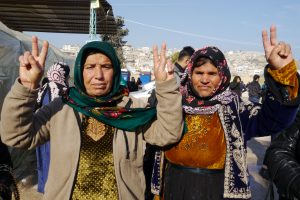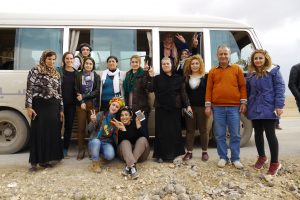 It is the 21st of February early in the morning that we start our trip to Afrin. It is the second voyage of its kind: People from all cantons of Rojava/Northern Syria get together in order to go all the way to Afrin in a civilian convoy, as human shields. An action to express the solidarity and common resistance, to express unity in the defence against the Turkish attacks and to show that what is happening in Afrin right now has no
It is the 21st of February early in the morning that we start our trip to Afrin. It is the second voyage of its kind: People from all cantons of Rojava/Northern Syria get together in order to go all the way to Afrin in a civilian convoy, as human shields. An action to express the solidarity and common resistance, to express unity in the defence against the Turkish attacks and to show that what is happening in Afrin right now has no 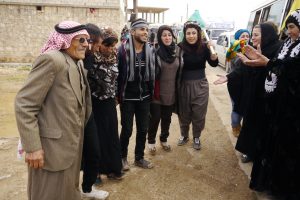 legitimacy, but is an attack on the integrity of the people and the land. City by city the people gather in one place and split up into different cars and busses. We are in a bus with a group of eighteen women – mothers, daughters, grandmothers, students, teachers, doctors, somewhere betweeen sixteen and seventy years. All the way they are singing, dancing in the bus, chanting slogans, waving the green, red and yellow flags out of the windows. We hear and share a lot of stories on the way. We meet Cihan, mother of five children, whose daughter Gulan had been killed during a Turkish attack in Afrin, one day after Avesta Xabur died. She wants to go to show her solidarity with the people in Afrin, and she wants to go in rememberance of her daughter. «We will go to Afrin, we are going together and we are not afraid» is the message we are carrying with us. Passing through the villages with the convoy we see how the defence of Afrin is uniting people. To see so many people standing in front of their houses, saluting the passing busses, honestly happy and excited about the convoy, gives us a lot of force for this voyage.
legitimacy, but is an attack on the integrity of the people and the land. City by city the people gather in one place and split up into different cars and busses. We are in a bus with a group of eighteen women – mothers, daughters, grandmothers, students, teachers, doctors, somewhere betweeen sixteen and seventy years. All the way they are singing, dancing in the bus, chanting slogans, waving the green, red and yellow flags out of the windows. We hear and share a lot of stories on the way. We meet Cihan, mother of five children, whose daughter Gulan had been killed during a Turkish attack in Afrin, one day after Avesta Xabur died. She wants to go to show her solidarity with the people in Afrin, and she wants to go in rememberance of her daughter. «We will go to Afrin, we are going together and we are not afraid» is the message we are carrying with us. Passing through the villages with the convoy we see how the defence of Afrin is uniting people. To see so many people standing in front of their houses, saluting the passing busses, honestly happy and excited about the convoy, gives us a lot of force for this voyage.
In the evening we reach Kobane. The people of Kobane already gathered around the big Arin Mirkan figure in the entrance of the town center to welcome the convoy. For half an hour everyone spreads out, a short manifestation, meeting friends and family in the convoy, taking pictures with the figure of Arin Mirkan, who had become symbol of the Kobane resistance. For the night we will stay here. The people of Kobane arranged that we can spend the rest of the evening in different families. Together with three women from Derik and Qamislo we spend the night in the house of Halime’s family. She has been in Kobane during the times of war against Daesh and she is working in the Asayish for about three years. She, her husband, their four children, her mother and the family of her brother are living in a small and simple house, not far away from the city center.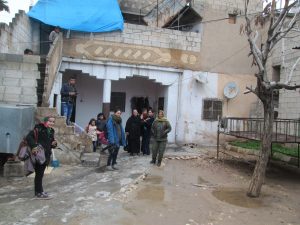 We sit together around the oven, drinking tea, eating dinner, talking about Kobane, Afrin, the war, old times, our families, the future. Emira, the older one of the two daughters, is working on her homework, proudly showing us her handwriting in kurdish and arabic. At six in the morning we leave again, saying goodbye to Halime’s family, promising that we will visit each other again soon, getting back to the busses to continue our way to Afrin.
We sit together around the oven, drinking tea, eating dinner, talking about Kobane, Afrin, the war, old times, our families, the future. Emira, the older one of the two daughters, is working on her homework, proudly showing us her handwriting in kurdish and arabic. At six in the morning we leave again, saying goodbye to Halime’s family, promising that we will visit each other again soon, getting back to the busses to continue our way to Afrin.
Around fifty busses are part of the convoy now, leaving Kobane towards Manbij, passing villages, gardens, fields, wide land. Again it is a day full of singing, dancing, chanting. It is incredible to see the energy and will for resistance, facing the fact that we are going to a zone of open war. In the afternoon we pass the border towards the area controlled by the Syrian regime, passing the empty villages and destroyed houses close to al-Bab. Kids playing in the streets, people working on the fields, buildings in ruins after the war against daesh, the checkpoints full of Syrian flags with pictures of Bashar al-Assad and his father Hafez, even some Iranian flags are waving in a few military points next to the street.
At some point in the evening we reach Afrin, crossing the checkpoint that marks the end of the regime controlled area, finally. Everyone is excited, we get up from our seats, singing the songs of resistance again and again. Then, from far, we hear the deep grrrrm of an explosion. It must be far, but we feel the pressure and see the lightenings behind the silhouettes of the hills. Sara, the young woman on the seat next to us, moves closer to her mother. A few women in the bus are shouting: «We are not afraid! May they scare us, may they throw their bombs, but we are not afraid! Biji berxwedana Afrine!» There are still shellings – the cars and busses turn off their lights, slowly we continue, then we stop. Silence, and another grrrrm. It is mainly the mothers that remain calm, calming the others down. At some point we get out and leave the busses, it is more save to stay outside, between the busses and the wall that marks the uphill side of the road. Another grrrrm next to us, just a little up the hill, but this time it is the sound of an airstrike. We throw ourselves closer to the wall while the stones, following the pressure of the explosion, fall down on the street next to us. Close to the wall we wait, taking the hand of the friends next to us. There are more explosions, next to the wall we wait until it gets calm again. Later we follow the road down to the village, waiting again next to the wall of a house until we can move. A family in the village invites us to come to their house to give us shelter, one by one we go, hiding from drones under the olive trees on the way. While other groups move on until the city we can stay in their home tonight. As women we stay all together in a room, covering with blankets, talking until late in the night.
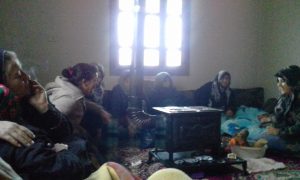
Stepping outside the door in the morning we meet the morning sun, green hills in a wide landscape, the orchard of olive trees in front of the door, thousands of little purple flowers all around in the grass. It is as if nothing ever happened to these lands. An hour later we get our stuff together, thanking the people of the village once again that they hosted us tonight. We leave the village, group by group, bus by bus, heading to the city of Afrin.
We are arriving to the central place where a lot of tents are set up. People gathered here since the early morning, dancing, shouting slogans, locals prepare tea and coffee for all. Here we meet everyone again, the friends we got to know during the voyage, happy to see each of them alive and in good condition. So here we are, in Afrin.
